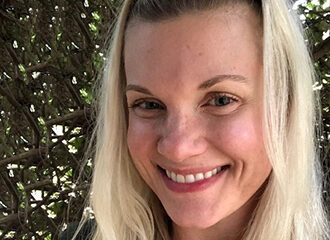By: Erin Birely, LCPC, The Renfrew Center’s Alumni Services Coordinator
 Burnout is something we all can experience in different areas of life: burnout in a job, in a relationship, with a task, or even in recovery. And while burnout is a universal feeling, we all feel it differently, at different thresholds, and for different reasons. One thing we can all agree on, though, is burnout isn’t good for us and isn’t good for whatever we’re working on or towards. However, it’s important to look at burnout because like with all emotional experiences, it is telling us something.
Burnout is something we all can experience in different areas of life: burnout in a job, in a relationship, with a task, or even in recovery. And while burnout is a universal feeling, we all feel it differently, at different thresholds, and for different reasons. One thing we can all agree on, though, is burnout isn’t good for us and isn’t good for whatever we’re working on or towards. However, it’s important to look at burnout because like with all emotional experiences, it is telling us something.
When you notice you’re burning or burned out, try and take some time to reflect on what this feeling is telling you. Is there something you need to let go of? Are you pushing yourself to meet expectations that aren’t reasonable? Is there a step towards your goal you’re missing, making it impossible to achieve? When we let ourselves rest and look for answers to these questions, we allow ourselves to maybe see things we’ve been missing or develop a new way to work towards our goal. This way we don’t find ourselves continuing to do the same things and being in an endless cycle of burnout.
So while burnout can be telling us something, it is also something we can learn to protect ourselves from. Try some of the tips below to help prevent burnout before it even hits:
- Involve others – Whatever you’re working, on get others’ ideas in addition to your own. Someone else may have another idea of how to get something accomplished or may notice a step you’re missing.
- Incorporate relaxation into your daily routine – Whatever that means for you, whether it’s taking a coffee break outside, throwing a ball for your dog, or watching a tv show.
- Ask for help – Delegate when you can and let others know if you feel like you’re burning out. Others may be able to help set more realistic expectations, advocate for you or just validate your feelings and help you find a way to rejuvenate.
- Listen to your body – Learn your body’s cues that you’re nearing burnout. When is it telling you to slow down, pull back, or to all-out stop? Try and learn when you need to take a break and give it to yourself.
Erin Birely, LCPC, started working as the Team Leader of The Renfrew Center of Baltimore in September 2016 and joined the Alumni Services Team in 2019 as the Alumni Services Coordinator. Prior to joining Renfrew, Erin had worked in private practice as well as inpatient, partial and intensive outpatient levels of care. Erin has worked in the field of eating disorder treatment since receiving her Master’s degree in 2012. She enjoys working with people to make positive and long lasting changes in life through therapy and building their emotional tolerance.



